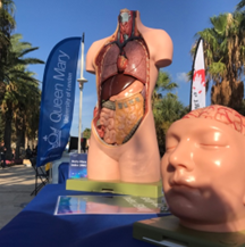Talking Trauma Part 2: Malta
In a second post James Piercy, the Involvement and Engagement lead in the Centre for Trauma Sciences at Queen Mary, describes how he took his team's outreach work to Malta.

James Piercy, the Involvement and Engagement lead in the Centre for Trauma Sciences (C4TS), recently visited the QMUL Malta campus to work with colleagues on public engagement as part of the science in the city programme.
C4TS conducts research projects in trauma sciences with a particular focus on blood and bleeding. The team are keen to raise awareness of their work into clotting disorders and to engage audiences with their research. The aim of this overseas adventure was two-fold: to build connections between C4TS and the Malta campus and to talk to local people about trauma research and how this can affect treatments and outcome following serious injury.
James first visited the new campus buildings on Gozo which, like the Blizard institute, is next door to a hospital. He presented Brilliant Blood an interactive show about blood and its behaviour. One hundred primary-aged children from the Happy School walked to the site and enjoyed a presentation about blood types, transfusion and circulation. The show uses volunteers, demonstrations and audience questions to build understanding of a sometimes difficult topic.
The show was also presented to family audiences in Malta as part of a programme of presentations exploring science in everyday life.
The main event took place just outside Valetta with a pop up festival of science activities taking advantage of Malta’s great weather to run free public activity outside. Medical students from the Malta campus were on hand to demonstrate anatomical models, take blood pressure readings and get visitors to take fake blood samples from a cannula arm. The ‘blood’ was tested to see how well it formed clots leading to discussion of C4TS research projects and recent publications about coagulopathy and blood testing.
It was a great learning experience for the students, who practiced their communication as well as technical skills. Hundreds attended the stand over two nights learning about medical research, human health and how to become a doctor.